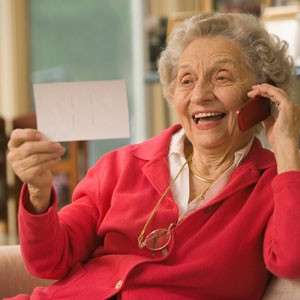By: Linda Burhans
 Caregiving responsibilities can occur without warning, so without proper planning, it can create a crisis situation, particularly if you live far away.
Caregiving responsibilities can occur without warning, so without proper planning, it can create a crisis situation, particularly if you live far away.
On the other hand you may not even realize that your loved ones need help. When you call on the phone, mom will not tell you that she fell last week or that dad hasn’t gone to the bathroom in 3 days. She will not tell you that they haven’t been out of the house in weeks and they are not eating properly. In fact, her biggest concern will probably be not trying to burden you or losing her independence.
If moving closer to the senior or having the senior move closer to you is not an option, the following tips may make your long distance caregiving easier:
1 – Get to know your loved one’s neighbors when you visit – identify one or two trustworthy neighbors and ask if they can check in on your loved one – call them weekly for an update.
2 – Get to know the local mail carrier – if he/she sees that the mail has not been brought in, he can alert you or a neighbor.
3 – Get to know your loved one’s friends – they can be eyes and ears when you aren’t around. Keep in touch with them regularly.
4 – Create a list of your loved one’s medical issues, medications, doctor’s names, and legal documents in case you need to access them in an emergency.
5 – Research your loved one’s illness. This will help you understand what your loved one is going through and will also make it easier to talk to your loved one’s doctors.
6 – Investigate non-medical senior services in the area, such as transportation, community centers, professional care/companionship, geriatric care managers, adult daycare etc.
7 – Hire a Home Health Care company to provide daily or occasional assistance for daily tasks, such as grocery shopping, medication reminders, running errands, meal preparation, housekeeping etc. One of the most important roles of these professional caregivers is to provide companionship, as well as be the “eyes and ears” for the family who lives far away.
8 – Plan for emergencies. Set aside time and money in case you need to make an unexpected visit to help your loved one. Inquire with your employer about taking leave under the Family & Medical Leave Act.
9 – And try to visit as often as possible. You definitely don’t want to have regrets later.
Many seniors are initially resistant to outside help. But when shown the benefits, many enjoy having non-medical, professional caregivers in their home and they will thrive and appreciate the help and company.
If you happen to have the opportunity to visit with them during the holidays, KEEP YOUR EYES OPEN! This may be the time you realize they need help.
Many long distance caregivers have guilt about not being to do enough when their loved one is in need. If you’re feeling guilty, remind yourself that you are doing the best you can. Many find it helpful to join a support group for caregivers. You will benefit from the tips of other caregivers and know that you are not alone.